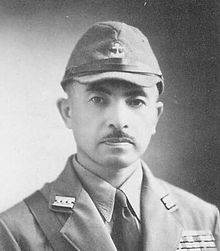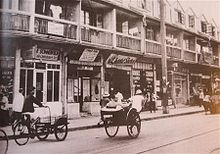Jewish settlement in the Japanese Empire
The onset of the European war by Nazi Germany involved the lethal mass persecutions and genocide of Jews, later known as the Holocaust, resulting in thousands of Jewish refugees fleeing east.Jacob Schiff, a Jewish-American banker who, thirty years earlier, offered sizable loans to the Japanese government which helped it win the Russo-Japanese War, was well known.[citation needed] In 1922, Yasue and Inuzuka had returned from the Japanese Siberian Intervention, aiding the White Russians against the Red Army where they first learned of the Protocols and came to be fascinated by the alleged powers of the Jewish people.Over the course of the 1920s, they wrote many reports on the Jews, and traveled to the British Mandate of Palestine to research the subject and speak with Jewish leaders such as Chaim Weizmann and David Ben-Gurion.Their numbers, as high as 13,000 in the 1920s had halved by the mid-1930s in response to economic depression and after events relating to the kidnapping and murder of Simon Kaspé by a gang of Russian Fascists[3] and criminals under the influence of Konstantin Rodzaevsky.After receiving exit visas from the Soviet government, many Jews were allowed to cross Russia on the Trans-Siberian Railway, taking a boat from Vladivostok to Tsuruga and eventually settling in Kobe, Japan.Germany had violated the Non-aggression Pact, and declared war on the USSR, making Russia and Japan potential enemies, and therefore putting an end to the boats from Vladivostok to Tsuruga.[21] Jews entering and residing in Japan, China, and Manchukuo were treated the same as other foreigners and, in one instance, Japanese officials in Harbin ignored a formal complaint by the German consulate which was deeply insulted by one of the Russian-Jewish newspapers' attack on Hitler.During the six months following the Five Minister's Conference, lax restrictions for entering the International Settlement, such as the requirement for no visa or papers of any kind, allowed 15,000 Jewish refugees to be admitted to the Japanese sector in Shanghai.[citation needed] However it was bombed just months before the end of the war by Allied planes seeking to destroy a radio transmitter within the city, with the consequential loss of life to both Jews and Chinese in the ghetto.Influential Japanese intellectuals including Uchimura Kanzō (1861–1930), Nitobe Inazō (1862–1933), Kenjirō Tokutomi (1868–1927) and professor in colonial policy at Tokyo University, Tadao Yanaihara (1893–1961), were also in support.[25][26] A high-level Japanese government reports on plans for mass emigration to Manchuria in 1936 included references to ethnic conflict between Jews and Arabs in Palestine as scenarios to avoid.Koreshige Inuzuka's help in rescuing Jewish refugees from Nazi-occupied Europe was acknowledged by the Union of Orthodox Rabbis of the United States which saved him from being tried as a war criminal.They stated that the plan, which was viewed by its proponents as risky but potentially rewarding for Japan, was named after the Japanese word for puffer-fish, a delicacy which can be fatally poisonous if incorrectly prepared.[31] They allege that such a plan was first discussed in 1934 and then solidified in 1938, supported by notables such as Inuzuka, Ishiguro Shiro and Norihiro Yasue;[32] however, the signing of the Tripartite Pact in 1940 and other events prevented its full implementation.[37][38] Political blogger Sima Nan's Weibo channel spread the notion that Jews colluded with the Empire of Japan to establish a Jewish homeland in mainland China during the Second Sino-Japanese War.
World War IISecond Sino-Japanese WarJapanese EmpireNazi GermanyHolocaustantisemitic conspiracy theoryImperial JapanJewish refugeesMarvin TokayerFugu PlanManchukuoShanghaiAmerican JewryThe Protocols of the Elders of ZionrabbisJudaismShintojournalismHollywoodfreedom of religionworld Jewish communityKoreshige InuzukaNorihiro YasueYoshisuke AikawaKwantung ArmyJacob SchiffRusso-Japanese WarJapaneseJewish diasporaBolshevik RevolutionJapanese Siberian InterventionWhite RussiansRed ArmyBritish Mandate of PalestineChaim WeizmannDavid Ben-GurionForeign Ministry of JapanSeishirō ItagakiKanji IshiwaraMukden IncidentHarbinSimon KaspéKonstantin RodzaevskyantisemitismAbraham KaufmanKiichiro HiguchiHideki TojoPrime MinisterFumimaro KonoeForeign MinisterHachirō AritaArmy MinisterNaval MinisterMitsumasa YonaiFinance MinisterShigeaki IkedaManchuriaboycottKristallnachtStephen WiseShanghai ghettoSoviet Unionnon-aggression pactBaltic statesTripartite PactKaunasChiune Sugiharatransit visasCuraçaoJan ZwartendijkTrans-Siberian RailwayVladivostokTsurugaattack on Pearl HarborAnglo-American Trading with the Enemy ActBaghdadi JewsDepartment of TreasuryGestapoObersturmbannführerJosef MeisingerImperial Japanese ArmyKenpeitaiconcentration campChongming IslandYangtzepopulation densityManhattanDavid KranzlerAlliedChinda SutemiJapanese EmperorUchimura KanzōNitobe InazōKenjirō TokutomiTokyo UniversityTadao YanaiharaPalestinecooperative agriculturalRighteous Among the NationsMir Yeshivayeshivathe HolocaustUnion of Orthodox RabbisJewish Autonomous Oblastpuffer-fishJapanese Foreign MinistryHebrew UniversityPolitical bloggerSima NanEmpire of Japanmainland ChinaMichael KoganAntisemitism in JapanBirobidzhanSoviet territorySanjiang ProvinceEast Asian JewsHakko IchiuMakuyaJudeo-ChristianShōwa periodHistory of the Jews in JapanHistory of Jews in KobeHistory of the Jews during World War IIIsrael–Japan relationsRacial Equality Proposal



